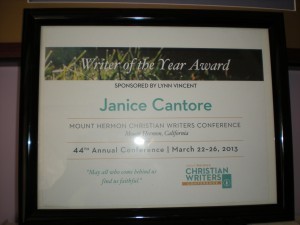Janice Cantore's Blog, page 4
March 28, 2013
A Word or Two About Writer’s Conferences
 When I first started attending Writer’s Conferences, I was brand new to writing stories. All I had under my belt were some badly written short stories and a burning desire to learn if it was even possible for me to write stories people would read. I think I heard about conferences from a writing class. The first one I attended was bumpy and one I will never forget. One published author I spoke to there loved my story idea and pointed out an editor who she was certain I “needed to speak to.” I did, and he hated what I showed him. Not that he hated my idea, but the writing so offended him he didn’t get past the first paragraph in the fifteen minutes we had together so he never heard the idea. I left that day defeated, clinging to the words of the published author, “you’ve got a great idea here,” and trying to work the sting out of my encounter with the editor.
When I first started attending Writer’s Conferences, I was brand new to writing stories. All I had under my belt were some badly written short stories and a burning desire to learn if it was even possible for me to write stories people would read. I think I heard about conferences from a writing class. The first one I attended was bumpy and one I will never forget. One published author I spoke to there loved my story idea and pointed out an editor who she was certain I “needed to speak to.” I did, and he hated what I showed him. Not that he hated my idea, but the writing so offended him he didn’t get past the first paragraph in the fifteen minutes we had together so he never heard the idea. I left that day defeated, clinging to the words of the published author, “you’ve got a great idea here,” and trying to work the sting out of my encounter with the editor.
I kept writing and revising and heard at other conferences that you could learn your craft, no one is born writing best selling novels, everyone has to start somewhere. Many lectures and many writing books later I know that for me, the learning will never stop. My first conferences were a blur of rushing from workshop to workshop, polishing the book, working up the courage to pitch, being rejected and starting all over again. Along the way, among the rejections, I kept getting little tidbits from people who encouraged me to keep trying, not to give up, everyone gets rejections you just have to learn from them. I developed a love/hate relationship with writer’s conferences. At one my confidence would be buoyed, and at the next shattered because it seemed as though I would never “arrive.” By the time I’d finally signed a contract with a publisher, grabbed the brass ring I’d been trying for for years, I hadn’t been attending conferences, the last one had been a negative experience.
But it soon became obvious that signing a publishing contract does NOT mean that all the hard work is over, it is just beginning in a new phase and I needed to learn about this new phase. A writer’s conference was the place to go. Now, facing a different kind of pressure in my writing career, I found there is a lot more to a conference then rushing to and from workshops and learning to pitch. There is a community of like minded people with like fears, failures, successes and insecurities, who can help me and who I can help. There is also a wealth of knowledge available from those who come to teach, people who have best sellers and multiple contracts behind them.
This year I headed up to the 2013 Mt. Hermon Christian Writer’s Conference with few expectations. I just wanted to be with other writers, to learn from those who’ve been successful, keep working on my craft, and hopefully encourage the new comers. By the last night of the conference I felt I’d accomplished these things and felt the entire conference had been a success. I was not prepared for one of the biggest honors I have ever received when I was awarded the Writer of the Year Award. It was a surprise I doubt I’ll ever forget, and humbling because I doubted that I deserved it. There was so much talent at that conference and many other writers that I would have cast my vote for if I’d been asked. But I will be forever thankful. The award is a welcome surprise and as I remember my first writer’s conference, I am so glad I stuck with it.

March 20, 2013
Guest Post Candace Calvert : Of Cops, Nurses, and Full Moons
 Janice and I met in Dallas last fall, at the American Christian Fiction Writers’ annual conference. I’d been sort of stalking her (though I probably shouldn’t confess that in the presence of law enforcement) during the conference. I admire her work and we share a publisher, so I figured we should meet. I couldn’t find her. Then at breakfast on the final day, she introduced herself saying she’d been hoping to meet me.
Janice and I met in Dallas last fall, at the American Christian Fiction Writers’ annual conference. I’d been sort of stalking her (though I probably shouldn’t confess that in the presence of law enforcement) during the conference. I admire her work and we share a publisher, so I figured we should meet. I couldn’t find her. Then at breakfast on the final day, she introduced herself saying she’d been hoping to meet me.
In truth, it makes sense on a much broader scale: cops and ER nurses. They go together like cold pizza and stale coffee. Hold on, I mean that in a good way. If you’ve ever worked a holiday night shift (during a full moon) you’ll know that there are times when that dubious food combination will save your life. You’re grateful. Just as I was grateful working in a small ER many years back. A full-moon night shift. When I needed a police officer, stat.
I was young, so squeaky-new that I still ironed my scrubs. The hospital was rural, small. On the night shift, it was just me and the doc. It was my duty to jostle him awake when a patient arrived for treatment. The community had one police officer on patrol at night, not much older than I was. Officer Pease—that always made me smile, Peace Officer Pease. But that night was anything but peaceful . . .
The man who comes through back door is tall, bone-thin, agitated, and jumpy. He makes me nervous right away. There’s a young child with him. Runny nose, sad eyes. Has an earache the man says. And needs to be seen immediately, he insists, refusing to give medical information or fill out any paperwork. I try my best to gently explain that we need at least the basics. He begins to pace, raise his voice—and then a fist.
Trying to wake the doctor is like prodding a hibernating bear.
The man in the corridor paces, curses . . . escalates.
The doctor mumbles he’ll be right there. What’s the big deal about an earache?
The man tells me he has a shotgun in his car. Takes off at a jog toward the parking lot, child bouncing his arms.
I tell the doctor.
He locks the door to his sleeping room. (You will not find this man as a hero in any of my novels).
I dial the hospital operator–no outside lines in those days. Explain quickly what’s happened; tell her to call the police.
My heart is in my throat; I’m grateful there are no other patients . . . I wonder briefly who’ll take care of me if I’m shot. Will the doctor consider that a big deal?
I’m hiding near the doctor’s locked door—hear footsteps in corridor beyond. Peek around the corner of the wall. Freeze. The blood in my head rushes toward my feet.
Officer Pease is standing there, spread stance, gun in hand— pointed my way.
If I’d had cold pizza that night, I’d have thrown it up. The officer looked as pale as I felt.
Apparently the hospital operator told the dispatcher, “A man is threatening our nurse with a gun.”
My hero (not the doctor—did I mention that?) was coming in fully prepared to save me.
As it turned out, the agitated man in the car outside did not have a gun . . . and I do believe we went on to treat his child that night.
Eventually the full-moon-crazy subsided for all of us.
Officer Pease and I probably shared some burnt coffee . . . and mutual respect. I was grateful he was there for me that night, and he was grateful I’d be there in the ER if, God forbid, he drew his gun another time and it didn’t go well.
Or if, simply, his own child had a miserable earache in the middle of the night.
Cops and ER nurses. We get each other.
Visit Candace at www.candacecalvert.com

March 12, 2013
Motive
In the courts, ascertaining motive or intent is an integral part of the legal process. The determination of a person’s motive can mean the difference between the death penalty, life in prison, a long sentence, a short sentence, and freedom. When Cain slew Abel there was no hiding his jealous intent from God and God chose the punishment that fit the crime.
I watched a program the other night, interestingly about two brothers. One was in custody for killing the other and he claimed that his brother attacked him and his only motive for the killing was self defense. Since the court doesn’t have God’s omnipotence, the judge had to listen to testimony from the prosecution as to why they didn’t believe it was self defense and from the defense as to why it was most certainly self defense. It was interesting watching the process. In the end the judge granted the the claim that it was self defense, basically saying that the prosecution did not have enough evidence to prove otherwise. The brother was set free.
When constructing a suspense or mystery novel involving a crime, motive makes the whole story more believable, but it may be murky at first in order to keep the mystery strong and compelling. I’ve heard it said in writing classes that there are three main motives for murder: love, money, or to cover up a crime. While those are the big three, I would add a couple more, revenge for one. The recent incidents here in California with Christopher Dorner indicate that the motive for his murderous rampage was revenge. Gang members will sometimes murder random subjects or rival gang members to prove themselves to the gang. Terrorists kill to incite terror. There is also a small segment of criminals who commit murder for the “thrill” or the perceived notoriety the crime will give them.
But what if there is no clear motive? In the Star Trek spin off, Voyager, Tuvok, a Vulcan (all logic, no emotion) is the ships security officer. In one episode there is a murder on board the star ship. When Tuvok finds the murderer and the murderer can’t tell him why he committed the crime, Tuvok goes a little nuts; he can’t conceive of such a crime being committed with out a motive. But then Vulcans are ruled by logic while killers seldom are. Yes, most crimes probably have a clear motive, but some make an investigator scratch their head. I remember handling a homicide where the manager of an apartment building was shot and killed simply because he asked a drunk man to stop urinating in the ivy in front of the building. The drunk was angry, but he was also drunk which made something that might have been only a shouting match turn into a homicide. People can be murdered over the stupidest things. When the drunk sobered up I wonder if he regretted taking someone’s life for absolutely no reason.
No clear motive would make a crime harder to solve. If you interview ten people knowing one was the murderer, but not knowing which one, you’d need a motive to narrow the field. Without God marking the killer like Cain, a random killing with no discernible motive would be tough for any cop to solve.
Trivia question: In the book of Numbers, God deals with murder and motive, or lack thereof. He cites specific instructions for dealing with those who kill accidentally as well as for those who kill with intent. What makes a difference to God in these situations, in other words, what does God cite as showing malicious intent on the part of the slayer?
Cite chapter and verse, and only from Numbers, the translation I use is the New Living Translation.

February 15, 2013
Reality Versus Television
 I don’t watch much TV, but there are a couple of shows I like, one is Castle, which is fiction through and through. In a lot of episodes the cops go bursting in on bad guys, guns drawn and everyone gives up and there is no blood drawn. Oh, if it only worked that way in real life. Listening to the coverage and the questions from the press about the recent manhunt for Christoper Dorner here in California (40 mins from my home) I am forced to the conclusion that too many people believe TV is reality. I’m sickened by the people that want to make a mass murderer some kind of hero. They forget that this all started when Dorner lay in wait for an innocent couple in the parking structure of their condo complex and shot them both multiple times.
I don’t watch much TV, but there are a couple of shows I like, one is Castle, which is fiction through and through. In a lot of episodes the cops go bursting in on bad guys, guns drawn and everyone gives up and there is no blood drawn. Oh, if it only worked that way in real life. Listening to the coverage and the questions from the press about the recent manhunt for Christoper Dorner here in California (40 mins from my home) I am forced to the conclusion that too many people believe TV is reality. I’m sickened by the people that want to make a mass murderer some kind of hero. They forget that this all started when Dorner lay in wait for an innocent couple in the parking structure of their condo complex and shot them both multiple times.
I heard a reporter ask why the police didn’t give Dorner a chance to surrender. Excuse me, he had plenty of time to do that after his first murder, but he seemed to want to keep killing. If he was hiding in plain sight after he burned his car in the mountains he had ample time to turn himself in. If he was afraid of the police, then there were thousands of reporters he could have approached or reached out to. I also heard someone ask why police let the cabin burn to the ground before the fire department came in. Well, there was live ammo going off because of the fire. I know some firefighters and I don’t know a single one stupid enough to approach a fire while live ammo is going off.
The stand off with Dorner was a dangerous reality show in progress, there was no way for the cops to rush in and cuff the bad guy with no blood being shed. In fact two police departments paid with their dearest blood, senselessly and tragically at the hands of Dorner. People talk about his grievances and to me his grievances became inconsequential the minute as he took the life of his first victim. Everyone has grievances about something in this life, thank God they don’t all pick up guns and go on killing sprees.
This was just a little venting about a horrible situation. My heart goes out to the families of the police officers who were brutally murdered. May it give them a small sense of peace to know the threat of more killing is over.

February 7, 2013
Is There a Perfect Murder?
 There is a line from the TV show Castle that goes something like this: “Two types of people sit around and try to think of ways to kill people, psychopaths and mystery writers, I’m the one that pays better.” Since I write suspense and mystery, I too sit around ant try to think of ways to kill people. A question that often comes to mind, Is there a perfect murder? I’m sure people have committed murder and have not yet been caught, but could someone really plan and commit a perfect murder? Here are two real life scenarios of people who tried to do just that.
There is a line from the TV show Castle that goes something like this: “Two types of people sit around and try to think of ways to kill people, psychopaths and mystery writers, I’m the one that pays better.” Since I write suspense and mystery, I too sit around ant try to think of ways to kill people. A question that often comes to mind, Is there a perfect murder? I’m sure people have committed murder and have not yet been caught, but could someone really plan and commit a perfect murder? Here are two real life scenarios of people who tried to do just that.
Scenario one: A man, I’ll call Homer, is drowning in debt. His life insurance policy is worth 4 million dollars. Trouble is, he has to die to collect the money. So he devises a scheme to only make it look as if he has died. He lures another man, I’ll call him Tim, with a similar build to his garage, kills him and then sets the body on fire, making certain to remove all of Tim’s ID and replace it with his own ID, then he flees in Tim’s car to another state with Tim’s ID and credit cards, planning to become Tim since everyone will think the burned body in his garage is Homer. Homer had help from his wife who probably planned to collect the life insurance money and then join her husband.
Scenario two: A devoutly Hindu man is furious when his son, I’ll call him Moe, marries a non Hindu woman, I’ll call Grace. Despite the father’s fury, the couple seems happy, they have a baby daughter and life seems to be going smoothly for them. They move away from angry daddy to the town where Grace’s parents live. And tragedy strikes, Moe tells Grace and her family that his father has died suddenly. He attends the funeral in India by himself. Then one day some time after that, Moe comes home from work to find Grace stabbed and strangled in their apartment. The baby is unhurt but there is no evidence left at the crime scene as to who killed Grace and why. The case goes cold for years.
The first plan seemed to work for a while. Tim’s body was burned beyond recognition and initially police believe Homer is the dead man. But this crime really was not well thought out. First of all, Tim had family who knew immediately something was wrong when he didn’t come home. They went to the police right away so when Homer used Tim’s credit card to rent a hotel room, the jig was up. Tim was in the system as missing/endangered so police were sent to check out the hotel room. Homer, realizing he was found out, killed himself when police knocked.
The second plan almost worked. With no evidence at the crime scene and no suspects since the only person that hated Grace was Moe’s dad, police are baffled and the case goes cold. It’s about six years before they get a break. A woman is arrested after leading police on a chase in a stolen car. At the station she tells cops she has information about a murder. When she describes the murder, cops realize she’s talking about Grace and they call the detective who handled her case. The woman describes the homicide scene exactly and names the killer, I’ll call him Ted. Apparently, Ted took two women with him to Grace’s apartment. They knocked on the door and asked Grace if they could use her bathroom. When she said yes, Ted forced his way inside, then told the girls to wait in the car while he killed Grace. Neither Ted nor the girls have any relationship with Moe or Grace, they are complete strangers. Police look for Ted and find that he is in prison serving time for armed robbery. Eventually he tells them he was hired to kill Grace by a man I’ll call Howard. Again, Howard doesn’t seem to have any connection to Grace or Moe, why would he want her dead? Then they find out that Howard was Angry Daddy’s business partner in another state. And low and behold, they also find out that Angry Daddy is not dead! Eventually he is convicted of hiring Ted through Howard to kill his daughter in law. (there is more to the story about his faked death, but it’s complicated.)
In both scenarios, the killer thought he was devising the perfect murder. But only the second one had any chance of working, and it might have worked if Ted hadn’t taken witnesses to the crime with him. I personally believe it’s impossible to think of every contingency when planning a murder, which works great for a novel. Something always trips the killer up so the murder or crime can’t be perfect, my fictional detective has to solve it. And there really is no such thing as the perfect murder because nothing is secret from God. So even if someone thinks they’ll get away with it here on earth, they will be busted sooner or later.

February 1, 2013
Personal Safety
 I love to watch true crime shows. One of my favorite is called “Disappeared.” To me the most frustrating thing in the world would be a loved one who simply vanished without a trace. Disappeared is the story of the search for people who, most of the time, are never found. I often try to put myself in the investigators shoes, was there something else that I would have done, a question I would have asked. Sadly, many times when it’s a woman gone missing, I often find myself saying, what were you thinking? It amazes me how naive some women are. They are too free with their information on the internet, too trusting when it comes to strange men, and too vague with close friends and family members about their plans. Be safe, don’t do obviously unsafe things.
I love to watch true crime shows. One of my favorite is called “Disappeared.” To me the most frustrating thing in the world would be a loved one who simply vanished without a trace. Disappeared is the story of the search for people who, most of the time, are never found. I often try to put myself in the investigators shoes, was there something else that I would have done, a question I would have asked. Sadly, many times when it’s a woman gone missing, I often find myself saying, what were you thinking? It amazes me how naive some women are. They are too free with their information on the internet, too trusting when it comes to strange men, and too vague with close friends and family members about their plans. Be safe, don’t do obviously unsafe things.
Often women are hurt because they trusted what a complete stranger said on line. Years ago when internet dating was just getting started, I knew a couple of people who traveled to other states to meet individuals they had connected with on line. At the time I thought it was stupid, people on line can say anything. And in both cases I was right. Both of my friends were disappointed in the person they went to meet: the person was not who or what they represented on line. Thankfully neither of my friends got physically hurt. Yet there are still people who trust an on line persona and end up getting hurt, or worse, disappearing. It’s usually a woman who gets victimized by some guy on line, but it could also happen the other way. Bottom line, know who you are talking to before you set up a meeting with an internet acquaintance. (Better to meet people the old fashioned way, in person and formally introduced)
Another thing I noticed was that often people who live alone don’t let friends or family know their plans. I’ve seen programs where women take off for another city without telling anyone where they are going, who they are seeing, were they are staying, etc. By the time family and friends realize something is wrong, an investigator is knocking on their door. Let someone know your plans if you travel alone and check in with someone when you arrive.
Now most of the time when people meet with foul play, there is nothing they could have done to prevent it. But there are times when simple common sense decisions will save you and those you love a lot of grief.

January 16, 2013
Pilfered Privacy
 Have you ever read a news story about a burglar who hurts himself burglarizing a property and then sues the owner/victim for pain and suffering? I have a few times and it always makes me angry. But it makes me angrier when some jury actually awards the crook money. It’s an upside down world, especially when those that are doing wrong expect to be rewarded. The other day I read an article about the expectation of privacy and the internet. (WSJ “Pilfered Wi-Fi Is No Shield From Prying Eyes of Police.” Monday 09/26/2012) The fact that a man who steals internet service by piggybacking off his neighbor’s connection and then expects that his right to privacy is protected by the Fourth Amendment doesn’t surprise me, but it is irritating.
Have you ever read a news story about a burglar who hurts himself burglarizing a property and then sues the owner/victim for pain and suffering? I have a few times and it always makes me angry. But it makes me angrier when some jury actually awards the crook money. It’s an upside down world, especially when those that are doing wrong expect to be rewarded. The other day I read an article about the expectation of privacy and the internet. (WSJ “Pilfered Wi-Fi Is No Shield From Prying Eyes of Police.” Monday 09/26/2012) The fact that a man who steals internet service by piggybacking off his neighbor’s connection and then expects that his right to privacy is protected by the Fourth Amendment doesn’t surprise me, but it is irritating.
The right to privacy, spelled out in the Fourth Amendment of the Constitution, “The right of the people to be secure in their persons, houses, papers, and effects, against unreasonable searches and seizures, shall not be violated, and no warrants shall issue, but upon probable cause, supported by oath or affirmation, and particularly describing the place to be searched, and the persons or things to be seized.”
The internet stealer thought that because the police have to use special software (interestingly enough called “Moocherhunter”) they should have been required to get a warrant before trying to find him and tried to suppress the evidence they’d found against him. (He’s a pedophile, downloads kiddie porn) Thankfully the court ruled against him. The person who pays for the internet connection through a subscriber service can’t hide behind their IP address so neither can the thief. But the case will be appealed, the suspect’s lawyer thinks that her client should get a pass. Basically her reasoning is, he stole the internet connection to keep his location private, therefore it’s a Fourth Amendment issue.
It’s an interesting case, but I see it no differently than the burglar suing his victims. The crook was in the wrong on so many levels, the law should not be his savior.

January 4, 2013
Which Way, Left or Right?
 I love science fiction, growing up I read a lot of it. And I watched a lot. I’m a huge Star Trek fan, just about all of the franchise, and I love X-Files, The Twilight Zone, Fringe. One plot that occurs often in just about any series is one where a character is confronted with a choice, go left or go right, and because it’s fiction we can see the consequences of each choice. He goes right and hits another star ship and his ship explodes, killing everyone, flash, time goes backward and he has the opportunity to make another choice, this time he goes left and just misses the collision and everyone is okay. It would be nice if life worked that way, if you could rewind a bad choice and make another one with better consequences.
I love science fiction, growing up I read a lot of it. And I watched a lot. I’m a huge Star Trek fan, just about all of the franchise, and I love X-Files, The Twilight Zone, Fringe. One plot that occurs often in just about any series is one where a character is confronted with a choice, go left or go right, and because it’s fiction we can see the consequences of each choice. He goes right and hits another star ship and his ship explodes, killing everyone, flash, time goes backward and he has the opportunity to make another choice, this time he goes left and just misses the collision and everyone is okay. It would be nice if life worked that way, if you could rewind a bad choice and make another one with better consequences.
I remember working with people who so feared making the wrong choice they couldn’t make a decision and they would dance around the choice, but that never works, especially when a decision must be made. I think this concept is on my mind because of the new year. The start of a new year always seems like a good place to take stock and make decisions. It’s time to go through the closet and decide what I really need and what I can give away. Ditto the pantry, I need to go through that and toss all the fattening, unhealthy food away. And books, I need to thin out the book shelf, donate the books I’ve read and don’t need to keep. Is there anything I need to add to my life right now or is it all about removing the clutter? (I guess if you saw my desk you’d say it’s all about removing the clutter.)
Right now, at this stage of my life, I don’t see any earth shattering-scary-intimidating choices on the horizon. Nothing that I’d want to set up in a science fiction time machine to change if it doesn’t go right. Is that good or bad? It could change. If I’ve learned anything in 53 years, life can change on a dime and not always for the best. All the more reason to make the best decisions I can at this point in time. So it’s on to the closet, the pantry, the bookshelf, whose afraid of hard choices? Not me, at least, not right now.

October 2, 2012
Who’s Watching You?
 Before I left police work completely, I worked on a training bulletin for a new technology, Automated License Plate Recognition software. Basically, it was a scanner mounted on the patrol car that would scan license plates while the officer drove and notify him if there was an alert attached to the plate, or if it were a stolen vehicle.
Before I left police work completely, I worked on a training bulletin for a new technology, Automated License Plate Recognition software. Basically, it was a scanner mounted on the patrol car that would scan license plates while the officer drove and notify him if there was an alert attached to the plate, or if it were a stolen vehicle.
I thought this was a great idea. When I worked in a black and white, the only way to run a license plate was to verbally ask the dispatcher to run it and relay the information or to type the plate in myself on the car computer. Both of those methods take time and attention, but what if the stolen vehicle doesn’t catch your attention? The idea of a camera just running every plate you pass that is in range of the scanner and then letting me know if the vehicle is wanted or stolen sounds extremely helpful.
In a Wall Street Journal article, New Tracking Frontier: Your License Plate (09/28/2012) the author notes that the technology that allows government agencies to surreptitiously monitor, record, and or track people has grown in sophistication and dropped in price in recent years. Lower price means more departments can budget for the technology. The article cites examples of a couple of agencies in California who use automatic license plate readers and have a huge data base that collects information about innocent people simply driving around, going about their daily activities. Some are bothered by this “big brother” activity.
I don’t think it’s a big deal. I think the technology can help law enforcement in the long run and I think that is a good thing. I even think casual surveillance like cameras here and there might have a purpose and a role in helping law enforcement.
My next fiction project will deal with cold cases and I’ve been doing some research on the subject. On the FBI website you’ll find two names, Tara Grinstead and Jennifer Joyce Kesse. Both are pretty young women who have been missing for years and foul play is suspected. Their cases are similar but not officially linked. Both strikingly pretty, they each disappeared from their homes without a trace. At Grinstead’s the only evidence found was a latex glove in the front yard.
Kesse’s disappearance has something more creepy involved and this is where casual surveillance has a role. Her vehicle was found dumped in a parking lot some distance from her home. A camera mounted on a business near the lot captured the image of the man who dumped her car. Unfortunately, the shot wasn’t close enough to get a clear image of his face. But there he is, walking away from a missing woman’s car.
What if the camera had clearly photographed the man? A lot of questions could be asked and hopefully answered if he were identified and located.
A lot of people may see cameras and license plate scanners as intrusive. I can understand that argument as well. But if a license plate scan or a surveillance camera could save a life or locate a missing person, I think it’s a good thing.

August 29, 2012
One More Trip
I suppose that when a loved one passes, those left behind often have a “one more” wish. One more talk, one more hug, one more day, etc. For me when I learned my mother’s cancer was out of control, my one more was one more trip.
My mother was an inspiration to me in so many ways. She loved her family, she loved life, she appreciated things, even small, insignificant things and she loved to travel. My sister and I were the youngest and when we moved out of the house mom’s travel plans switched into high gear. Since my dad didn’t have the same desire mom joined clubs, the Sierra Club and Canyon Explorers so she’d have travel companions. She learned to ski and backpack in her sixties and embraced both pastimes with passion. Over the years she backpacked Mt Whitney, skied in California, Colorado, Oregon, Montana, Canada, and Switzerland. Rode her bike in Alaska and enjoyed every journey. She kept in touch with this group for years, often telling stories about their travels and the great times everyone had.
Later, when I graduated from college, I became a travel companion. Mom and I made annual ski trips to Mammoth and summer trips to Oregon. She was always looking forward to the next trip, had one planned with her club in May of 2013. I had a trip planned with her to Hawaii in November of this year. But the cancer cancelled those plans and my one more trip with my mom was not to be.
Over the years, mom rarely complained, took care of my father who often complained and made the house I grew up in a home in every sense of the word. I would come home for Sunday dinner and she would be in her element fixing something special, whether it was just my dad and me or I’d brought friends. Every Thanksgiving for 40 years it was my mother’s pleasure to fix a big dinner for family, extended family, and anyone else who happened along. Some of my fondest memories are of those Thanksgivings and my mother’s meals. She cooked with love.
As age began to catch up with her she endured two knee replacements, a broken hip, a hernia operation and a minor stroke. (After her second knee replacement, at the age of 86, she asked the doctor if she could go skiing again. He said no and she was crushed)
After she passed I found a saying she kept on her desk. She’d typed it on a small card and then laminated the card. It reads,
“Clock of Life. The clock of life is wound but once and no one has the power to tell just when the hands will stop, on what day, or on what hour. Now is the time you have so live it with a will. Don’t wait until tomorrow the hands may then be still.”
My mom didn’t wait and she lived a long and glorious life. We knew she had cancer, had known for about a year. But until it began to rob her of breath my mom kept living, planning and being a shining example of a mom.
One of my mother’s favorite stories to tell of my dad was that when they met, he followed her home on the bus. A little over three months later they were married and that marriage lasted 68 years until his death. The end of the story today is that a little after three months my mom’s last trip was following my dad home and there they’ll be together for eternity.
I miss you and I love you Mom and look forward to seeing you again in heaven.





